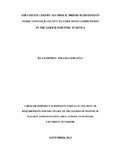| dc.contributor.author | Kihanya, Geoffrey M | |
| dc.date.accessioned | 2016-04-21T06:27:36Z | |
| dc.date.available | 2016-04-21T06:27:36Z | |
| dc.date.issued | 2015 | |
| dc.identifier.uri | http://hdl.handle.net/11295/94463 | |
| dc.description.abstract | The liquor industry is one of the oldest and most dynamic sectors of the Kenyan economy. The increase in the middle class population and growing local and international investor interest in this sector has led to tremendous growth and stiffened competition in the industry. The sale of unauthorized second generation liquor and traditional brews to quench the demand of low-end consumers has added fuel to the fire in the regulatory and competition landscape. This study sought to establish challenges of competition encountered by Alcoholic drinks businesses in Nyeri Town Sub-County and to identify strategies adopted by these businesses to cope with competition in the liqour industry in Kenya. The study utilized a cross-sectional design where questionnaires were delivered to a sample 50 enterprises registered in Nyeri Town Sub-County who were chosen by stratified random sampling. External challenges were identified as leading where stringent government regulations, competition from similar outlets and difficulty of entry were cited under this category. Marketing challenges and competition from illegal brews were considered as moderate. The findings identified cultivation of customer loyalty and diversification into new products as some of the competitive strategies used. Competitive action plans included providing clean and attractive outlets and providing extra facilities like DSTV and WIFI. Differentiation, cost leadership and focus strategies were also considered important. These strategies were to be actualized through the improvement of the quality of goods and services, business rationalization and targeting the mass market respectively. Segmentation was considered to a little extent. The study recommends that policy makers should consider licensed alcoholic drinks businesses as legitimate investments similar to other sectors of the economy. Enforcement agencies including KEBS and NACADA should work proactively to prevent the production of poisonous alcoholic drinks. It also recommends formation of strong business associations and establishment of alcoholics’ rehabilitation centers. To cope with the competition the study recommends that alcoholic drinks outlets should design and implement innovative strategies of dealing with their challenges. It further recommends that they should always undertake market surveys considering all the four Ps of the marketing mix in order to target the segments with best competitive advantage. They should also undertake regular customer needs analysis which should form the basis of stocking their products | en_US |
| dc.language.iso | en | en_US |
| dc.subject | Strategies Used by Alcoholic Drinks Businesses | en_US |
| dc.title | Strategies Used by Alcoholic Drinks Businesses in Nyeri Town Sub-county to Cope With Competition in the Liqour Industry in Kenya | en_US |
| dc.type | Thesis | en_US |

